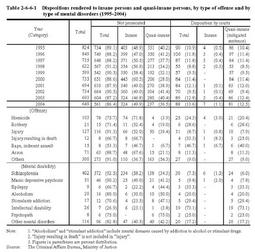| Previous Next Index Image Index Year Selection | |
|
|
1 Disposition by the public prosecutors officeand courts In criminal trials,persons who,due to mental disability,are unable to discern between right and wrong for their own actions,or who have such discernment but are unable to act on it,are treated as insane persons and should therefore not be punished.Also,persons whose ability of discernment or ability to act on such discernment is extremely limited are treated as quasi-insane persons,and their punishment is mitigated accordingly.
Table2-6-6-1 shows(a)the number of suspects who were not prosecuted by public prosecutors on the grounds of being insane or quasi-insane,(b)the number of persons who were found not-guilty on the grounds of being insane or given a mitigated sentence on the grounds of being quasi-insane in the court of first instance,over the last10years,and(c)dispositions in2004by type of offense and type of mental disorders. Table2-6-6-1 Dispositions rendered to insane persons and quasi-insane persons,by type of offense and by type of mental disorders(1995-2004) In2004,among the649insane and quasi-insane persons,383were involuntarily admitted to mental hospitals,and55were sentenced to imprisonment without suspension of execution of sentence based upon the offense which he/she committed or taken into custody based upon criminal procedure for other offenses which he/she committed(see Appendix2-16 ). |
